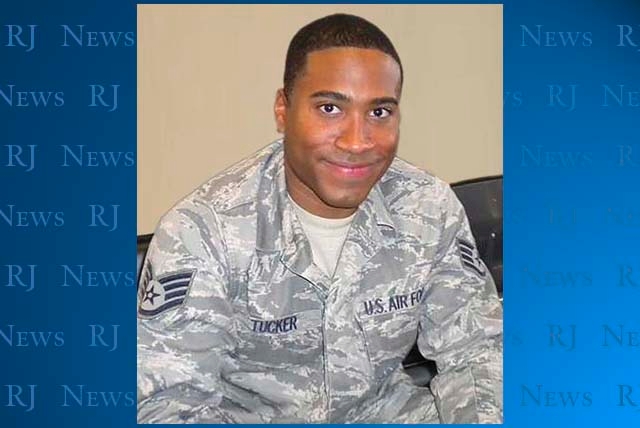Body recovered at Lake Mead confirmed as missing airman

Antonio Tucker’s family waited 10 months for closure.
Steve Schafer delivered it in less than two days.
The local dive instructor led the team that found the missing airman’s remains at the bottom of Lake Mead on Tuesday.
The search was launched Monday despite windy conditions. By Wednesday, Tucker’s body had been brought up from the dark, 280 feet down, to begin its journey back to his loved ones.
“It took less than four or five hours of actual search time,” said Schafer. “The biggest thing is to bring Antonio home. That’s what it’s all about.”
The Clark County coroner’s office identified Tucker’s body on Thursday.
The 28-year-old staff sergeant stationed at Creech Air Force Base in Indian Springs is believed to have drowned, but the cause of his death has not yet been released.
“We would like to express our condolences to Antonio’s loved ones and his extended Air Force family,” said Christie Vanover, spokeswoman for Lake Mead National Recreation Area. “Our thoughts and prayers are with them as they find closure following this tragic incident.”
Tucker was at the lake with a woman and a child on June 23 when he went under while trying to swim back to their boat in heavy winds.
As the National Park Service-led search dragged on, Schafer contacted the park to offer his help free of charge.
Schafer owns Earth Resource Group, a local environmental consulting firm with a marine division specializing in underwater survey and recovery work. He is also a dive instructor for dive instructors, with 20 years of experience exploring the deepest parts of Lake Mead.
After about a week of waiting for an answer, Schafer was told that the Park Service had all of the help it needed.
Vanover detailed that initial search effort Thursday, noting that the service and three other federal and state agencies spent four days looking for Tucker over 11 square nautical miles.
When they couldn’t find his body using sonar and remote operated underwater vehicles, she said, “the decision was made to wait for the body to surface naturally, which is a process that occurs with the majority of unrecovered drowning victims.”
Vanover added that Lake Mead park rangers have conducted more than 200 search and rescues in the past three years. Tucker was the only known missing person who hadn’t been recovered.
“Each death and each missing person weighs heavily on the hearts and minds of park rangers who devote their careers to saving lives,” she said.
About a month after Tucker disappeared, Schafer tried to get information and approval to search for another drowning victim who went missing in Lake Mead in 2004. This time, he couldn’t get anyone at the park to answer his emails, so he hired a lawyer, filed a request for public documents and, earlier this year, applied for a special-use permit to search for Tucker on the family’s behalf.
Late last month, the service finally cleared him for a search. His crew included experienced divers and recovery experts who traveled in from across the West, including a couple from Idaho, Gene and Sandy Ralston, whom Schafer called “probably the premier search team in the country.”
They fanned out in three boats across a square mile of water in the area where Tucker disappeared. They found him with a special sonar array and brought him up in the claws of a remote-controlled submarine .
Vanover acknowledged that Schafer and his team have more advanced equipment than the service does. And the current budget situation makes it unlikely that the park will be able to upgrade its gear any time soon, she said.
“We are thankful that these volunteers applied for a permit and were able to devote their advanced resources to the search and recovery of Antonio Tucker,” Vanover said.
Asked whether he felt vindicated, Schafer said, “It proves the point. That would be an understatement I think.”
Ultimately, though, he said he doesn’t want to trash the park or its people, most of whom are doing the best they can with scant resources and limited funds.
Vanover said Lake Mead personnel plan to review their response to this incident.
As for Schafer’s team, Vanover said, “We should be able to utilize their services much more rapidly, if they express interest in supporting future search efforts.”
Contact reporter Henry Brean at hbrean@reviewjournal.com or 702-383-0350.